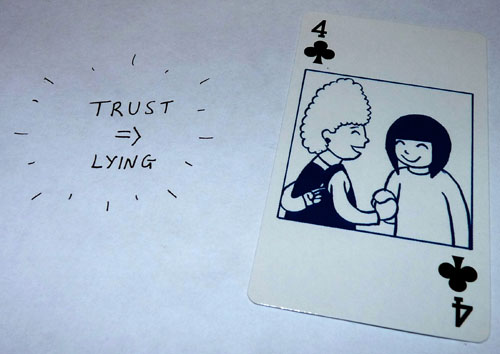Upcoming Event, Thursday August 4th
People that like Things are very likely to like this. On Thursday August 4th from 7pm-10pm, Hide & Seek are running a Sandpit gaming event at the Southbank Centre. In practice this means you get to turn up and play lots of interesting games (for adults) for free. Having been to quite a few of these in the past, I highly recommend it as the games are always fascinating and inspiring. I’m particularly excited about this one because Clare and I will be running a game ourselves, one based on the age-old problem of tessellating pieces of cheese to make a perfect sandwich.
More details of the event can be found here, and the official Facebook event is here. Let me know if you think you can make it!
Puzzle – Monty Hall
After talking to some people about last week’s Two Envelopes puzzle, I realised that many Things readers may not be familiar with the Monty Hall Problem, which one should really understand before tackling the Two Envelopes. So I’ll state that here, then go through the answers to both in the following Things.
In the Monty Hall problem, you are in a gameshow presented by the eponymous Monty. You are asked to choose one of three closed doors. Behind one of the doors is a nice car that you apparently want to win. Behind the other two doors are goats. If you choose the door with the car behind it, you win the car. If you choose a door with a goat behind it, I don’t think you win a goat, but you definitely don’t win the car. Basically the goats are there just for comedic effect.
So you choose a door, pretty much at random. At this point Monty (who knows where the car is) opens one of the remaining two doors to reveal a goat. He does this in every episode of the show – whichever door the contestant chooses, Monty will always then open one of the remaining doors to reveal a goat. He then offers you the chance to switch from your first choice to the other unopened door. The question is: should you switch?
Link
Sometimes The Onion packs a headline with so much satire it barely needs the accompanying article. Most recently I was impressed by American People Hire High-Powered Lobbyist To Push Interests In Congress.
Quote
From Jon Stewart’s speech at the “Rally to Restore Santiy”:
The press can hold its magnifying up to our problems bringing them into focus, illuminating issues heretofore unseen or they can use that magnifying glass to light ants on fire and then perhaps host a week of shows on the sudden, unexpected dangerous flaming ant epidemic.
Picture
This National Geographic healthcare data visualisation achieves a rare feat: showing the data in an unconventional way that nonetheless actually tells a story with the data quite well. Charlie Park has some great commentary on why a scatter plot of this data isn’t actually as useful in his general discussion of slopegraphs.
Click for big:



